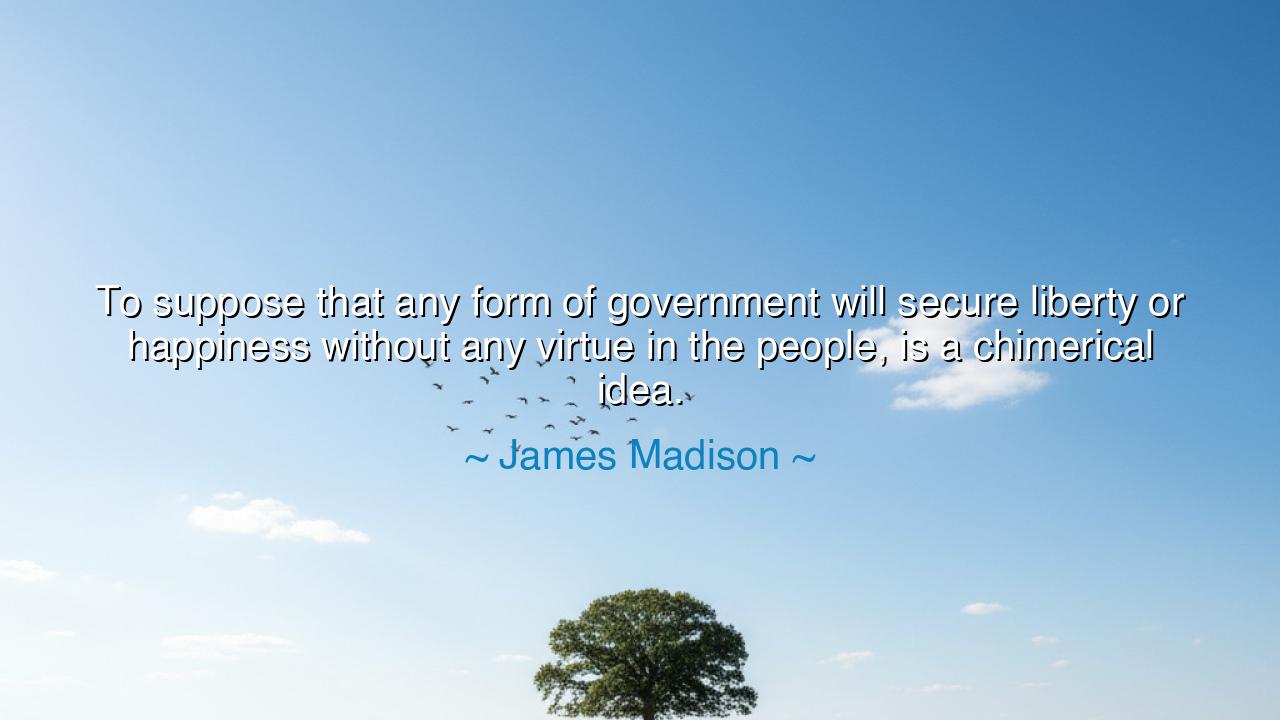
To suppose that any form of government will secure liberty or
To suppose that any form of government will secure liberty or happiness without any virtue in the people, is a chimerical idea.






"To suppose that any form of government will secure liberty or happiness without any virtue in the people, is a chimerical idea." — James Madison
In these solemn and immortal words, James Madison, the “Father of the Constitution,” reveals the heart of what sustains a free nation. His warning is as sharp as it is timeless: no government, however just, no constitution, however wise, can preserve liberty or bring happiness to a people who lack virtue. For laws are but ink on paper if the hearts of men are corrupt. Institutions, however strong, will crumble when the spirit that upholds them decays. A society without virtue is like a body without breath — outwardly alive, but inwardly dead.
Madison spoke these words in the early years of the American republic, when the promise of democracy was still a fragile flame flickering against the winds of ambition and greed. He and the other Founding Fathers had witnessed tyranny under kings and chaos under mobs; they understood that freedom could only endure where self-restraint guided power and conscience ruled the will. Thus Madison declared that virtue among the people was the true foundation of liberty — not armies, not wealth, not even the Constitution itself. For the Constitution, he said, was “a parchment barrier” if those who lived under it did not govern themselves by honor, justice, and truth.
He chose the word “chimerical” with purpose. In the mythology of old, a chimera was a creature born of imagination — beautiful, impossible, and doomed to vanish when touched by reality. So too, Madison warns, is the dream of a free and happy nation without moral character. To believe that mere laws or systems could make men virtuous is to chase shadows. Government may restrain evil for a time, but it cannot create goodness. Only the people themselves — through faith, education, and self-discipline — can build the moral strength upon which liberty rests.
History bears grim testimony to his wisdom. Consider the fall of the Roman Republic, that once-great beacon of civic virtue and law. In its youth, Rome was governed by men of duty, who placed the welfare of the republic above personal gain. But as centuries passed, greed and ambition crept into the Senate; citizens traded responsibility for entertainment, justice for convenience. They cried for bread and games rather than wisdom and virtue. Soon, the republic collapsed, and in its place rose emperors and tyranny. Rome’s greatness was not conquered from without — it decayed from within. And thus Madison’s truth stands clear: when virtue dies in the people, freedom follows it to the grave.
Even in modern times, we see the echo of his words. No amount of technology, no reform or constitution can protect a nation where corruption, apathy, and deceit thrive. A dishonest citizenry breeds dishonest leaders. A society that prizes comfort above conscience will soon find itself enslaved not by soldiers, but by its own vices. True happiness, Madison reminds us, is not found in material abundance or fleeting pleasures, but in the quiet strength of a moral people — a people who do what is right not because they are watched, but because they are wise.
Yet, Madison’s message is not despair but hope — a call to awaken the virtue that lies sleeping in every human soul. He believed deeply in the capacity of individuals to rise above selfishness, to cultivate wisdom, courage, and justice. A free government, he taught, is a partnership between the rulers and the ruled, bound by the shared duty of moral integrity. When citizens practice virtue in their daily lives — in their families, their work, and their dealings with others — they strengthen the invisible fabric of liberty more than any army or law could ever do.
So, O listener of the ages, take Madison’s words to heart: freedom is not a gift bestowed, but a trust maintained. It demands vigilance not only from leaders, but from each of us. Every lie told, every duty neglected, every injustice ignored weakens the pillars of liberty; every act of courage, honesty, and compassion strengthens them. The fate of a nation lies not in the stars or in the state, but in the character of its people.
Lesson: A free society can only survive when its citizens are guided by virtue. No law can substitute for moral strength; no system can save a corrupt soul.
Practical Action: Cultivate personal virtue — honesty, humility, and responsibility — in your daily life. Teach your children the value of truth and service. Choose leaders not for their promises, but for their principles. Stand firm in conscience even when comfort calls you away. For every virtuous act, however small, is a stone laid in the fortress of liberty — and every selfish act, a crack in its wall. Thus is the fate of freedom written not in constitutions, but in the hearts of those who live beneath them.






AAdministratorAdministrator
Welcome, honored guests. Please leave a comment, we will respond soon